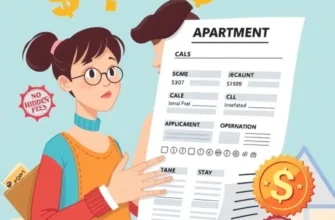Renewing your apartment lease might feel like signing up for a sequel to your least favorite movie—you know it’s coming, but you’re not quite sure if you want to watch it again! Whether you’re a first-time renter, a busy young professional, or just trying to convince your partner that staying put is a brilliant idea, navigating the lease renewal process can be a tad tricky. But don’t fret! With a sprinkle of know-how and a dash of humor, you can handle your lease renewal with confidence. We’ll dive into the nitty-gritty details: from deciphering your lease terms and negotiating better rates, to understanding when to consider moving. By the end, you’ll feel like a lease renewal pro, ready to make the best decision for your living situation. Buckle up and let’s demystify the thrilling world of lease renewals together!
Evaluating Your Current Lease: What to Consider

When contemplating renewing your apartment lease, it’s essential to give your current lease a thorough evaluation. One of the first aspects to review is rent price. Has there been a significant increase proposed for the renewed term? Compare the new rate with similar apartments in your area. This step provides context and bargaining power. You can often find reliable pricing comparisons on housing websites or by visiting nearby complexes.
Amenities play a crucial role in your living experience. Has your building maintained the promised features, such as a gym, pool, or community events? Assess their value to you. If they are not up to par, it might be worth discussing this with your landlord during negotiations.
Maintenance issues you’ve encountered are another critical factor. Review any repair logs or communications you’ve had with management. Consider whether problems were addressed promptly and satisfactorily. If not, this could be a negotiation point for improved maintenance services or even reduced rent.
This evaluation isn’t just about academic exercise; it’s about translating these insights into actionable tactics when negotiating your lease. Be ready to cite specific examples and comparison figures to strengthen your position.
If you’ve experienced high utility costs, you could explore switching to more energy-efficient options or negotiations for energy credits. Evaluating your apartment’s energy efficiency not only aids in reducing costs but also improves your living comfort. You might find more tips on efficient home care in your next reading.
Before finalizing anything, consider the broader context of your living situation. If your building hasn’t addressed a known radon issue, it might be time to reconsider your choice of residence. For more on staying safe from unseen hazards, visit this article on radon safety in apartments.
Lastly, evaluate your personal and career goals. Is the apartment’s location still convenient for you? Living close to work or in a vibrant neighborhood can significantly enhance your day-to-day life. Balancing these factors will help ensure your decision to renew your lease is based not just on financial aspects but also aligns with your overall lifestyle needs.
Negotiation Strategies: Getting the Best Deal

Understanding your current lease is the groundwork for effective negotiation. Once you’ve done that, it’s time to prepare for discussions that could lead to a rent reduction. One of the key aspects to consider is timing. Typically, approaching your landlord a few months before your lease ends can be advantageous. It allows them ample time to find a new tenant if your negotiations do not conclude favorably.
Preparation is essential. Begin by gathering information on current rental prices in your neighborhood. Use online listings and visit rental websites to understand the market better. If you discover that similar apartments offer lower rents, use this data as evidence in your discussion. Such market data strengthens your argument and shows you’re informed and reasonable.
Building a persuasive case goes beyond numbers. Highlight your positive rental history, like timely payments and maintaining the property well. Offering stability and reliability in these terms can be a compelling argument for your landlord. It may cost landlords more to find new tenants, and reliable long-term renters are valuable.
Cite any upgrades you’ve personally undertaken or maintenance issues you’ve praiseworthily managed. Demonstrating the value you’ve added to the property can also support your case for a rent reduction. Money saved from being proactive and handy can sometimes convert into dollars saved on rent.
Balancing these arguments with a willingness to make compromises increases your chances of success. Could you take a longer lease term in exchange for a lower rental rate? Perhaps you could suggest minor property improvements you’d be willing to make at your own expense.
Despite your best efforts, sometimes negotiations won’t yield the desired outcome. It’s important to know your limits and when it’s reasonable to walk away. If the offered rent is significantly above market rates and negotiation isn’t moving, consider looking elsewhere. You might find an area with more competitive rates or amenities that better meet your needs. Reading up on renting in diverse locations, like this article on renting in Charleston, SC, can be useful to broaden your perspective.
Ultimately, the goal is to reach a mutually beneficial agreement, but knowing when to pursue other options ensures you get the best deal possible. Negotiation is as much about understanding your leverage points as it is about recognizing what won’t work for you.
Final words
Renewing your apartment lease doesn’t have to feel like you’re trapped in an endless loop of paperwork and indecision. By taking the time to evaluate your current living situation and employing effective negotiation strategies, you can ensure you’re making a choice that benefits you and adds value to your living experience. Remember, the goal is not just to renew but to do so with confidence and ease. Armed with the advice in this guide, you’re ready to tackle your lease renewal like a champ. Whether you decide to hunker down for another term or brave the rental market, you can face the future with a smile—and maybe a few less late-night anxiety snacks. Good luck, and happy renting!









